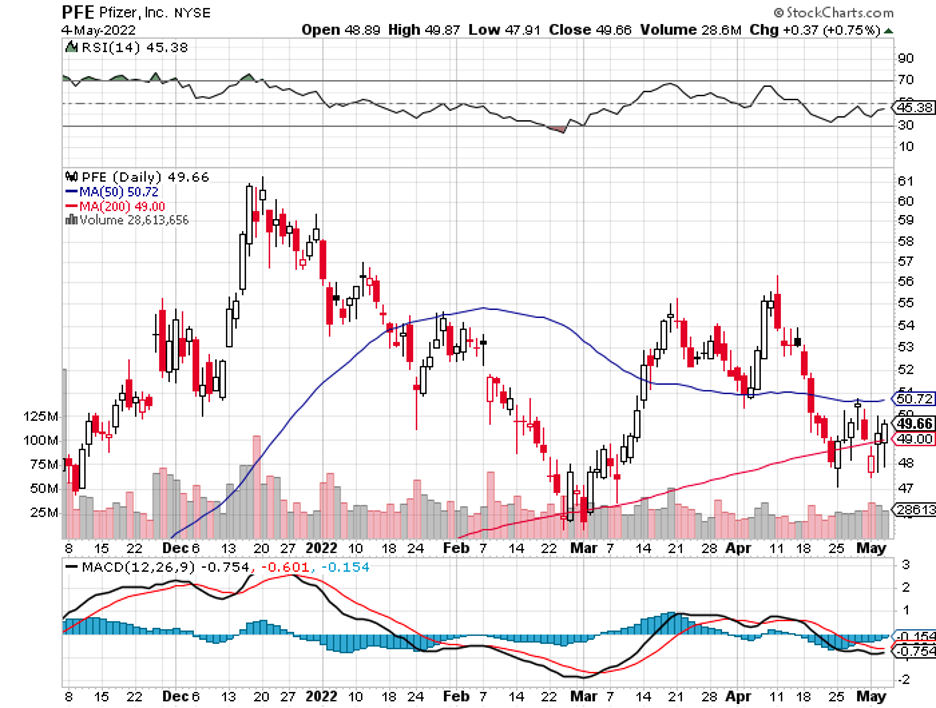A Pandemic Conqueror Ready for More
The past 50 years have been excellent for investors as stocks have climbed by over 100% within a five-year span ending last December 2021.
Sadly, this story has taken a different course in 2022 as investors became more cautious primarily due to inflationary fears.
However, a handful of businesses are strong and promising enough to survive and even thrive in a high inflation environment.
One company that met this challenge head-on in the healthcare and biotechnology sector is Pfizer (PFE).
In fact, Pfizer didn’t simply meet the estimates of Wall Street in its 2022 first-quarter earnings report. It blew past their expectations.
Pfizer recorded $25.7 billion in revenue for the first quarter, well above the consensus estimate of $23.9 billion. This represented a 77% surge year-over-year.
Meanwhile, its earnings per share of $1.62 was notably higher than the average $1.47.
As anticipated, these gains were mainly driven by the staggering revenues from its COVID-19 vaccine and antiviral medication.
Comirnaty continued its winning ways, with Pfizer generating a jaw-dropping $13.2 billion in sales from the vaccine it co-created with BioNTech (BNTX).
The company's market share in the developed world currently stands at 67%, while it holds 62% of the global market.
As for its Paxlovid antiviral treatment, this drug raked in $1.5 billion in the first quarter and claimed approximately 90% of the US market.
Evidently, Pfizer continues to receive massive boosts from its COVID-19 treatments.
Now, the real question moving forward hinges on whether these financial results can be normalized as part of Pfizer’s future regardless of the pandemic’s effects.
After all, the vaccine sales comprised almost 60% of the company’s total revenue. With this in mind, Pfizer remains firm in its projections that it could rake in $98 billion to $102 billion in annual revenue for 2022.
While this still indicates a strong belief in the pandemic-related treatments, it’s also indicative of a deeper and more diverse pipeline.
Although not as high-flying as the COVID-19 vaccines, a number of other categories notched notable gains year-over-year, like its rare disease segment, which saw a 23% increase.
The growth of its oncology sector, which recorded a 6% climb, was mainly attributed to the 35% rise and expansion of Pfizer’s biosimilar arm.
So far, the top-selling treatments in this segment are Retactrit, a biosimilar of Amgen’s (AMGN) Epogen and Johnson & Johnson’s (JNJ) Procrit, Zirabev, a biosimilar of Roche’s (RHHBY) Avastin, and Rixience, a biosimilar of Biogen’s (BIIB) Rituxan.
Even Pfizer’s pneumonia vaccines showed off a 22% growth this quarter with $1.57 billion in sales.
Apart from these, the FDA has recently lifted the hold on the Hemophilia A gene therapy clinical trials of Pfizer and Sangamo (SGMO).
Without this limitation, the two companies may already have the opportunity to catch up to the leading biotech in this sector, BioMarin (BMRN). If everything works out, Pfizer and Sangamo are slated to release a readout from this program by the second half of 2023.
Another venture that’s expected to pay off soon is Pfizer’s $6.7 billion acquisition of Arena Pharmaceuticals, which was seen as a decisive move to bolster its inflammation and immunology segment.
The company is expected to file for a regulatory for Etrasimod, Arena’s lead program on ulcerative colitis and Crohn’s disease, by the second half of 2022.
This means that the recent acquisition is already expected to add to the near-term growth of Pfizer, which could be as early as 2023.
Moreover, Etrasimod represents an incredible market opportunity, with the treatment projected to reach $28 billion in annual sales by 2025.
Aside from the promising potential of Arena’s pipeline, Pfizer’s move also shows how the company is leveraging the capital influx from its COVID sales and its strategy on a more aggressive growth investment cycle.
On top of that, Pfizer’s partnership with BioNTech highlighted the benefits and competitive advantage in terms of how the biopharmaceutical titan works and collaborates with smaller biotechnology firms.
Hence, Pfizer has made itself the first and obvious choice among budding companies with groundbreaking innovations.
Overall, Pfizer has proven itself more than capable of handling any economic and health crisis. Not only has it come up with a solution that ultimately saved humanity from a deadly virus, but it also emerged victorious and stronger amid a global meltdown.
Given its history and trajectory, it looks like it has nowhere else to go but up. Hence, it would be best if you bought the dip.


